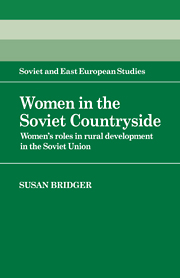Book contents
- Frontmatter
- Contents
- List of figures
- List of tables
- Acknowledgements
- Notes for readers
- Map: the Union republics of the USSR
- Map: the Non-Black Earth Zone of the RSFSR
- INTRODUCTION
- 1 WOMEN IN THE RURAL WORKFORCE
- 2 WOMEN IN THE RURAL FAMILY
- 3 WOMEN'S ROLES IN RURAL CULTURE
- CONCLUSIONS
- Notes
- Bibliography
- Index
INTRODUCTION
Published online by Cambridge University Press: 05 January 2012
- Frontmatter
- Contents
- List of figures
- List of tables
- Acknowledgements
- Notes for readers
- Map: the Union republics of the USSR
- Map: the Non-Black Earth Zone of the RSFSR
- INTRODUCTION
- 1 WOMEN IN THE RURAL WORKFORCE
- 2 WOMEN IN THE RURAL FAMILY
- 3 WOMEN'S ROLES IN RURAL CULTURE
- CONCLUSIONS
- Notes
- Bibliography
- Index
Summary
WOMEN AND RURAL DEVELOPMENT
Over the last quarter of a century, issues of development have been consistently brought to world attention, not least by the United Nations' Development Decades. The prime aim of these Decades has been to increase the rate of economic growth of the world's developing countries. This has been accompanied, since 1970, by a greater emphasis on aid from the richer countries to the developing world.
During this period, annual growth rates have indeed accelerated in developing countries. At the same time, however, they have ceased to be self-sufficient in food. As the production of cash crops for export and the development of urban-based industry has become ever more widespread, the production of basic foodstuffs to meet local needs has declined. By the end of the second Decade, 10% of the Third World's total consumption of food grains was imported. In many countries of Africa, Asia and South America the poor now form a greater proportion of the population than they did at the beginning of the sixties.
As the local effects of this pattern of development started to emerge by the beginning of the second Development Decade, women researchers began to point out the particularly distressing consequences for Third World women. Women form the majority of the world's food producers – 60% to 80% of agricultural workers in Africa and Asia – yet their huge contribution, these writers observed, was consistently ignored by development planners.
- Type
- Chapter
- Information
- Women in the Soviet CountrysideWomen's Roles in Rural Development in the Soviet Union, pp. 1 - 20Publisher: Cambridge University PressPrint publication year: 1987

